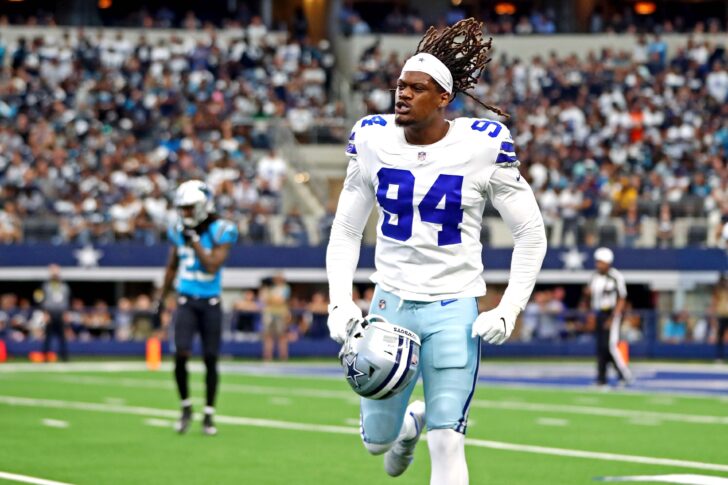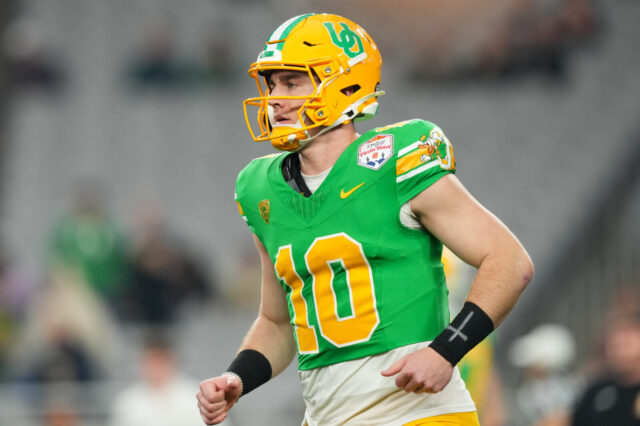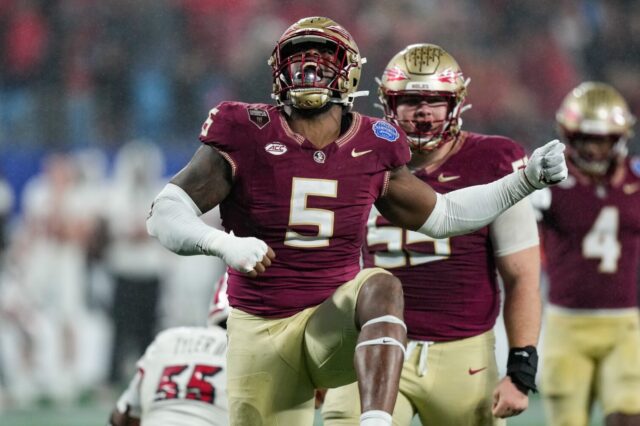The first week of NFL free agency is in the books, and Broncos Country continues to fly by on cloud nine, as a result of the Russell Wilson trade.
Setting Wilson aside, though, general manager George Paton still had a very impressive first week of free agency. Of his signings, which were the best, which were the worst, and how good of a job did he do overall?
We’ll take a look with this article, grading every single signing from the Denver Broncos’ first week of free agency.
Signing D.J. Jones, DT
The Deal: $30 million over three years, $20 million guaranteed.
At face value, this looks like a signing to replace the recently traded Shelby Harris, but given D.J. Jones’ pedigree as one of the NFL’s best run-stuffers, he might actually be a preemptive replacement for Mike Purcell, who is coming off his worst season in orange and blue.
Jones is an exciting run defender, who should go a long way towards boosting a Denver run defense that ranked 21st in run-defense DVOA a season ago. Jones’ addition should also free up Denver’s interior rushers somewhat, so they can pin their ears back and attack the quarterback.
To evidence his impact on the run game, Jones led all defensive linemen in defensive stops (defined as a tackle at, or behind the line of scrimmage) last season, and led all defensive linemen with at least 175 run-defense snaps with a defensive stop rate of 13.5%. He also ranks sixth in that crop in average depth of tackle, allowing just 1.4 yards on average.
https://twitter.com/ajdraftscout/status/1503586081593335811?s=21
Paton also managed to sign Jones to a reasonable, relatively team-friendly deal. Jones even claimed that he was offered more elsewhere but chose Denver anyways. Those savings can also be added to, as the team stands to save nearly $2.8 million if they move on from Purcell after June 1st.
That would make the Jones signing a steal, as it would mean it only ate up approximately $7.2 million worth of cap space, well below market value.
The Grade: A-
Signing Randy Gregory, EDGE
The Deal: $70 million over five years, $28 million guaranteed.
The Broncos’ decision to sign Randy Gregory to this sizable contract is certainly a risk, but it’s a calculated one, and one that shouldn’t be overly damaging if it fails to work out.
To start with the player, Gregory is a tremendously talented pass-rusher who has failed to fully live up to his potential as the result of suspensions and injuries. Since being drafted in 2015, Gregory has appeared in just 50 games, while missing a combined total of 63.
With that said, over 50 of those missed games are the result of suspensions connected to Gregory’s marijuana use, which he can no longer be suspended for, as of a 2021 rule change. That’s a large hurdle out of Gregory’s way.
It’s also extremely difficult to deny Gregory’s high-end talent. NFL Network’s Gregg Rosenthal, who ranks all of the league’s top free agent’s every single year, said that Gregory would have been on his midseason All-Pro team, prior to suffering a lower body injury.
Gregory’s upside is tantalizing, but he’s also a massive risk. Fortunately, it appears like the Broncos will be able to easily get out of the contract after two seasons, and the contract is at a reasonable rate, but it’s also not hard to imagine a world in which a lack of an edge rush ultimately dooms Denver.
The Grade: C+
Signing Ben Braden (G) and Tom Compton (G)
The Deals: $965,000 over one year for Ben Braden; one-year deal for an undisclosed amount for Tom Compton.
These deals are much less exciting — and require much less analysis — than the last two, but they’re both still quality signings that address impending needs for Denver.
Netane Muti was a delightful story, but he doesn’t work in Nathaniel Hackett’s offensive scheme whatsoever and will likely be moved on from as a result. Enter Ben Braden, a guard who developed under Hackett during his time in Green Bay, and who figures to provide solid depth at guard.
The same can be said for Tom Compton, though it remains unclear who he is set to replace. Safe money is on one of Dalton Risner, Graham Glasgow, or Lloyd Cushenberry (if Glasgow switches to center and wins the competition). Compton also provides the versatility to swing out to tackle in a pinch, but Broncos Country should expect to see him utilized primarily as a guard.
The Grades: B’s for both.
Re-signing Josey Jewell (LB) and signing Alex Singleton (LB)
The Deals: $11 million over two years, $6 million guaranteed for Josey Jewell; $1.1 million over one year for Alex Singleton, with up to $750,000 in incentives additionally.
Don’t let the fanbase’s lack of love, and the media’s lack of headlines surrounding Josey Jewell fool you, this deal is one of the best in Denver’s free agent class.
It’s easy to forget in March, but generally it’s not the massive swings that work out the best for the team. It’s the prudent mid-level signings in which they can find advantageous deals. Jewell is an excellent example of that.
Over his last 10 games on the field for the Denver Broncos, Jewell was playing the best football of his career and beginning to emerge as an excellent fit for Vic Fangio’s defensive scheme. His 2021 season was cut short due to injury, but as a result, the Broncos are able to get him for a sizable discount. They also practically have a team-option that allows them to decide whether they want to keep Jewell at that discounted price next season, in case an upgrade presents itself.
The Alex Singleton signing provides competent depth at the position and should primarily see his work on special teams.
The Grades: A+ for the Jewell deal, B for Singleton.
Re-signing DeShawn Williams (IDL) and tendering Malik Reed (EDGE)
The Deals: One-year deal for an undisclosed amount for DeShawn Williams; Right of first refusal tender ($2.4 million over one year) for Malik Reed.
With Shelby Harris — and potentially Purcell — out the door this offseason, bringing back a reliable piece in DeShawn Williams was a must for George Paton.
The team should still look to bring in more bodies at the position, but not signing Williams would have forced them to rely a lot on McTelvin Agim, who still needs to develop a good bit. Williams has the potential to start for them and be passable in that role, and they seemingly brought him back for a cheap price.
Filling a desperate need with a cheap, familiar, trusty option is always wise.
Making efforts to bring back one of your least impressive players, on the other hand, is not.
Malik Reed is one of the league’s least impressive edge rushers according to almost every advanced metric, and the Broncos edge room would be much better off if they could find an upgrade.
End of season edge chart!
Double team rate when pass rushing at edge (x) by pass rush win rate at edge (y).
Note: Micah Parsons did not qualify at edge, but I included him anyway because, well, look where he is.
(ESPN / NFL Next Gen Stats) pic.twitter.com/iIHcofzLuj
— Seth Walder (@SethWalder) January 14, 2022
That said, edge-rush help is a sizable need for the Broncos, and Reed has a pulse and is familiar with the team.
The Grades: B+ for Williams, C- for Reed.
Re-signing Calvin Anderson (OT) and Andrew Beck (FB/TE)
The Deals: $1.5 million over one year for Calvin Anderson, with up to $1 million in incentives; One-year deal for an undisclosed amount for Andrew Beck.
When discussing this Calvin Anderson deal, we have to have two separate conversations.
First, we must discuss the contract, which appears to be excellent. Anderson is a high-end backup, who nearly won the starting job last offseason, at a premiere position, who fits the scheme well, and has familiarity with the franchise. Getting that for $1.5 million at face value is a nice deal.
Second, we must discuss the Broncos’ plan for Anderson, which appears to be giving him a serious shot at the starting right tackle job. This aspect of their plan won’t affect the grade, as Denver is paying him backup money, even if they might be planning to start him.
Entering the season with Anderson as the starting tackle is a risky proposition, but one that shouldn’t worry Broncos Country too much. Anderson’s competition with Bobby Massie might have been even closer than the starting quarterback battle, and when asked to fill in for Massie, Anderson did a remarkable job. As Denver transitions to a scheme that better suits his abilities, it’s not crazy to think Anderson could play the position at a level similar to what Massie produced last year.
With that said, it’s still a sizable leap of faith on Denver’s side.
As for Andrew Beck, re-signing him was surprising but sensible. With the need for a fullback increased following the switch to Hackett’s scheme, it made sense that the Broncos might want to pursue a fulltime fullback, but they opted to run it back with Beck, who can also provide relief for Noah Fant’s absence, for cheap.
The Grades: A+ for Anderson, C for Beck
Signing Eric Tomlinson (TE)
The Deal: One-year deal for an undisclosed amount.
Sorry folks, Eric Tomlinson isn’t going to be your Fant replacement, but he can still provide some much-needed value to the tight end position.
That value will come almost entirely as a blocker, as Tomlinson has caught just two passes, gaining eight yards, over the last three seasons. He’s an excellent blocker though, as he has a missed block rate just over one percent, according to Sports Info Solutions.
It would’ve been nice to add someone a little more versatile, but Tomlinson’s cheap and does his job well.
The Grade: C+
Signing Josh Johnson (QB)
The Deal: One-year deal for an undisclosed amount.
This is a tough one to grade, as so much of it depends on how much Johnson signed for, which is information we don’t know yet.
As a general rule of thumb — which all you Broncos fans can use in the future in cases like this — when contract deals are reported, it’s because the agent is trying to market himself by showing off the great deal he got for his client. When they take a while to get reported, as is the case here, the deal tends to be more team friendly.
Operating under that assumption, that Johnson’s contract is somewhere between $3 million and $5 million dollars, this deal is excellent for the Broncos. Johnson was one of the best-performing backup quarterbacks that saw action last year, and his skill set isn’t too dissimilar to Wilson.
The Broncos want to contend this season, which means they need an adequate plan that can keep the ship afloat in case of injury. Johnson should be that.
The Grade: B+ depending on contract specifics
Overall Grade
George Paton is doing remarkable work and is beginning to make a name for himself as one of the NFL’s very best general managers, living up to what Broncos Country was promised upon his hiring.
However, let’s not mistake Paton’s tremendous success for god-like infallibility, as even Hall-of-Fame general managers are frequently wrong, and deifying football businessmen generally doesn’t work out well.
Not even one of these signings earned a grade below the average of ‘C’ and that’s because it’s really difficult to take serious issue with any of Paton’s signings. Paton’s overall grade will reflect that, but some of his shortcomings pop up in what he hasn’t done yet, so we’ll use this section to address those areas.
The signing of Anderson was an excellent one, but Denver’s subsequent plan to make that their only move at tackle is highly questionable. Those questions grow exponentially when considering that Russell Wilson is now in town, and the franchise’s most valuable commodity.
Another position that appears to be under addressed is nickel corner. The Broncos are expected to play a lot of dime this season, which requires them to have several cornerbacks on the roster who can play in the slot, yet they presently only have one. Plus, that one is Essang Bassey, who should not be relied on as the only plan at a premiere position.
Meanwhile, rather than addressing the hole on the defensive line, Paton spent money on upgrading a different position along that defensive line.
So many needs at premiere positions remain unaddressed, while needs at non-premiere positions — like backup interior offensive linemen, backup inside linebackers, and backup safeties — are chalk-full of potential solutions.
However, Paton has still done an excellent job overall, and in just two seasons, has turned the Broncos from also-rans into legit contenders.
Overall grade: B+



